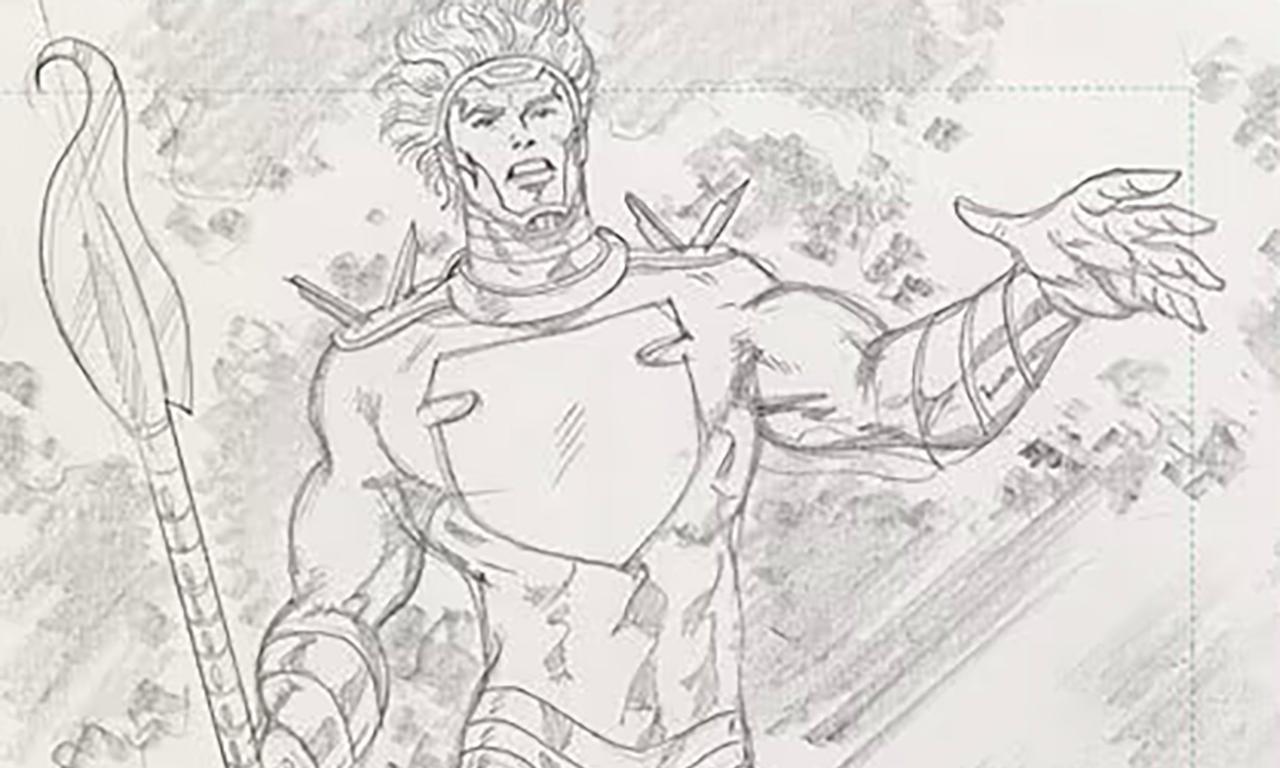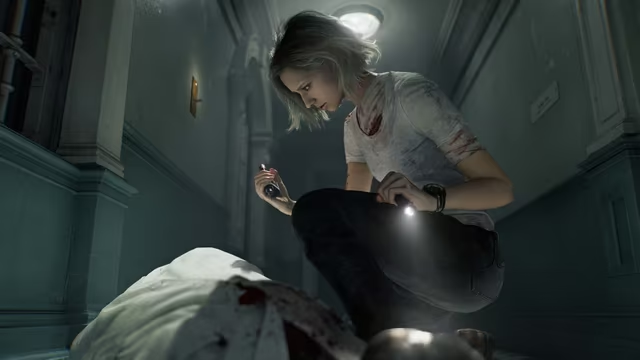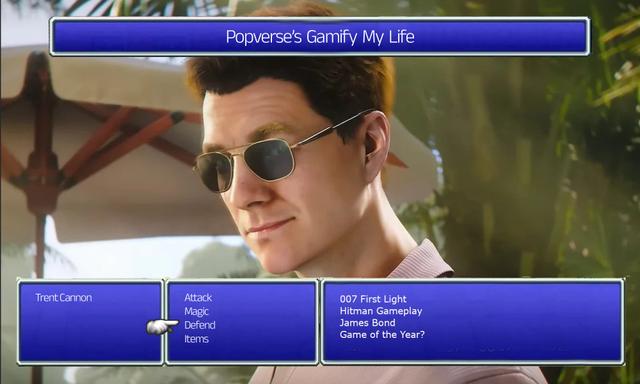If you click on a link and make a purchase we may receive a small commission. Read our editorial policy.
Who created Marvel's Sentry? The simmering Marvel Comics (and Marvel Studios) drama deepens as Paul Jenkins weighs in amid Thunderbolts* theatrical debut
In 2000, Marvel announced that Stan Lee and Artie Rosen created the Sentry. In the 25 years since, it's gotten more and more complicated.

Popverse's top stories
- Prime Video's Spider-Noir trailer is here, featuring a web-head with a drinking problem and... Electro?
- Daredevil: Born Again stars Charlie Cox, Krysten Ritter, and Wilson Bethel go from Hell's Kitchen to the Windy City for C2E2 2026!
- Marvel cuts its new Hulk ongoing comic after just 10 issues, but creators say that was the plan and there's already a sequel underway
Who created Marvel's Sentry? That question is one that has been the center of a 2000 marketing campaign for his debut, a 2005 New Avengers storyline, and now in the lead-up to the character's 2025 debut in the MCU with Thunderbolts*. Comic artist/writer Rick Veitch recently spoke out here at Popverse saying he was "cut out" after co-creating key elements of the character with Paul Jenkins, and now words from Jenkins himself have come to light pushing back on that idea - and that anyone besides Jenkins created the character, including Marvel's accredited Sentry co-creator Jae Lee.
As Thunderbolts* flies into theaters and the Sentry's involvement slowly comes out of the shadows, we are beginning to pull out of the shadows this simmering debate on the Sentry - and it all begins with the years of development before it reached its final form.
Earlier this week, a representative from Marvel confirmed that they have nothing in their official records from Rick Veitch during the development of the 2000 Sentry mini-series. However, they added that the lines of communication are open if Veitch wants to have a dialogue with them.
Paul Jenkins has declined to comment on Popverse's reporting.
The creation of Marvel's The Sentry, according to Paul Jenkins

"I ended up pitching [the Sentry] to a couple of editors, and they rejected it. Nobody would do the Sentry. And probably about two years after that, I asked Rick Veitch a favor, 'Hey man, can you draw me a picture of the Sentry so I can just add it to my pitch to see if it will help?' So he drew a picture of a character in a superhero thing in Rick's style," Jenkins tells Comic Frontier's Liam McGuire earlier this year. "Sentry had already existed as a pitch for maybe two years before I asked him for that picture. So I think the idea of the co-creation or anything like that is not even close because it already exists. The first story had already been written."
According to Jenkins, following the success of he and Jae Lee's Inhumans series in 2000, Marvel gave him carte blanche to write anything for them, and so he re-pitched the Sentry. After first trying to steer him to instead write "Spider-Man or Avengers or whatever," he said he was adamant about the Sentry - and that he and Lee convinced Marvel to greenlight the Sentry series.
Given the meta-nature of the Sentry's origin in comics, Jenkins was later written into Marvel comics as the creator of the Sentry - when the people inside the Marvel U believed he was just a comic book character come to life. As shown in the excerpt above, Jenkins is credited (by Iron Man) as creator of the Sentry; only later to be revealed the Marvel Comics' version of Jenkins didn't create the character like he thought. That issue was written by Brian Michael Bendis, with Jenkins' endorsement - and later involvement co-writing part of the arc.
Comparing the Sentry creation stories from Paul Jenkins and Rick Veitch

Generally, the facts of Veitch and Jenkins' stories line up, except for two key pieces. According to Jenkins, Veitch's sole contribution to the Sentry was that he drew "a picture" of Sentry, at the writer's request, for his Sentry pitch. According to Veitch, he drew several pieces for the Sentry pitch, and was the one who introduced the idea of the Sentry being a Superman-esque character, and he and Jenkins together conceived the idea that the Sentry was a forgotten '60s Marvel character both in-story and in real life.
The second key piece of this all is that Jenkins believes he is the sole creator of the Sentry, eliminating the idea that Veitch, who had been upfront he was involved in the original version of what would become the Sentry - or even Marvel Comics' listed Sentry co-creator Jae Lee should be able to claim credit. This is a similar argument that The Walking Dead's Robert Kirkman used to successfully fend of co-creator credits to The Walking Dead's original artist Tony Moore in court.
In 2001, Jenkins and Veitch seemed to be in agreement about the Sentry's creation (or close to it)
It's clear both Jenkins and Veitch believe their own distinct version of events. But a single quote by Jenkins from a 2001 issue of Wizard Magazine causes a big wrinkle in it. It's there that Jenkins is quoted as saying “I owe a great deal of gratitude to Rick. He’s responsible for quite a good amount of the ideas you see in The Sentry."
That sounds like a lot more than "a picture of a character in a superhero thing in Rick's style" that Jenkins says now in 2025.
In that same article, Wizard's reporter Christopher Lawrence writes, without attribution, "Veitch contributed a lot of ideas of Sentry, like Reed Richards and Sentry being best friends. A nixed idea: that the Watcher would remember who the Sentry was and play a role in the story. And Artie Rosen was originally going to be named 'Chick Rivet' - an anagram of Rick Veitch." Wizard also published, without attribution, that Veitch gave "the okay" for Jenkins to re-pitch the Sentry to Marvel without his involvement, on the heels of the success of Inhumans - leading Jenkins to approach Lee.
Who created the Sentry?

The truth of it all could lie in the middle. In both Veitch and Jenkins' statements, both agree that an early version of the Sentry idea (without that name) was conceived by Jenkins on his own. Both agree that Jenkins asked Veitch to help with the pitch Jenkins was shopping around to publishers. Veitch could have presumed since Jenkins asked him to contribute art to the Sentry pitch that he was attached at the least as an artist on the series, but both Jenkins and Veitch say that when the time came Marvel greenlit the series with Jae Lee as artist, following the success of Jenkins & Lee's Inhumans series.
Through a certain lens, you can see how Jenkins - who undisputedly created the original idea for what became the Sentry - should be a creator of the Sentry - and arguably the creator. But both Jenkins and Veitch are on record stating that Veitch had considerable contributions to what the Sentry became. And if you've read Jenkins and Jae Lee's Sentry series, I'd say the same for Lee. I'd even be open to John Romita Sr. getting some credit, as he illustrated the first published Sentry art, attributed to the fictional Artie Rosen.
But for some, the designation of 'creator' comes with it legal terminology, monies owed, and getting named in the credits of the MCU project in which they appear. For Marvel's part, Veitch's involvement in the Sentry pitch was not known to the company, according to a representative speaking to us this week.

For his part, Jenkins has said he's been denied credit to some of his work done for Marvel in the past when he's added on to what someone has been created before - and been mad about it. And like Veitch with us, he went public about it.
"I was pretty vocal about it and said it. I don’t like the bullying of creators, I don’t think it’s right. I think creators get treated really badly," Jenkins said in a 2002 interview with ComingSoon.net's Stephen Wilds.
Jenkins claims that he was denied fair credit for what he added to Spider-Man and Green Goblin's relationship as portrayed in the Sam Raimi Spider-Man movies with him saying it was deferred to Stan Lee, and also says he "created the origin of Wolverine" (as writer of the 2001 miniseries Origin) and was denied credit by Marvel in subsequent projects.
"I just don’t think it’s correct. It should have never happened, and it should never continue to happen, yet it has persisted."
Different circumstances of course, but I have a feeling Veitch would agree with you there, Paul.
Get ready for what's next with our list to upcoming comics and how to buy comics at a comic shop, and our guide to all the free comics you can get with this year's Free Comic Book Day and Comics Giveaway Day.
Follow Popverse for upcoming event coverage and news
Find out how we conduct our review by reading our review policy
Let Popverse be your tour guide through the wilderness of pop culture
Sign in and let us help you find your new favorite thing.
















Comments
Want to join the discussion? Please activate your account first.
Visit Reedpop ID if you need to resend the confirmation email.